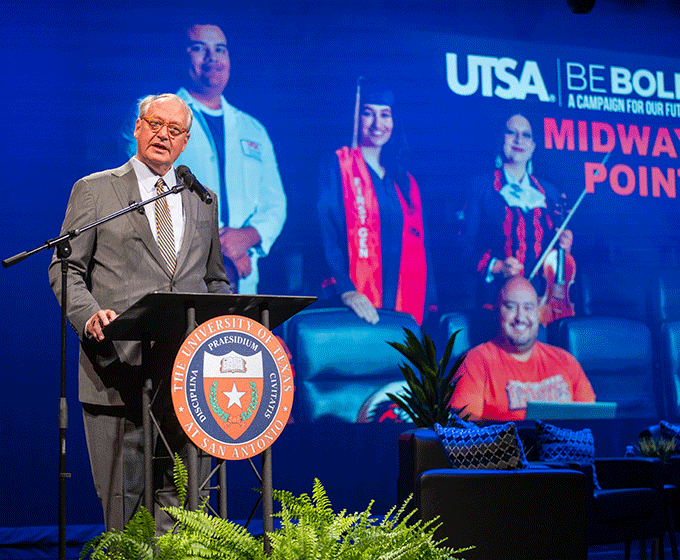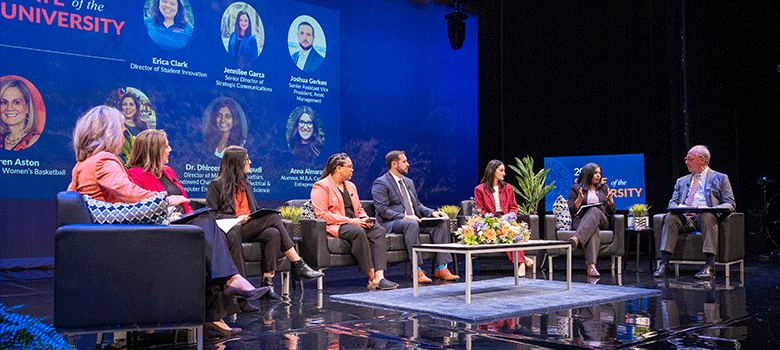
JANUARY 25, 2024 — This week, UTSA President Taylor Eighmy delivered his second State of the University address. He highlighted the university’s recent accomplishments, shared his vision for the coming year and moderated a panel discussion, including faculty, staff and a student representative to expand on the university’s opportunities for continued growth, innovation and discovery.
“I go back to this notion over and over about who we are, who we serve, how we serve and where we are going,” Eighmy said. “And I said this in the very beginning right when I got here in 2017, ‘UTSA is the university of the future in the city of the future,’ and that is still very, very appropriate today.”
During his presentation, Eighmy highlighted the development, expansion and enhancement of the key initiatives that are advancing UTSA’s 10-year strategic plan, including research excellence in AI and data science, downtown development and program expansions, experiential learning through the Classroom to Career initiative, and continued growth and success in athletics.

President Eighmy was joined on stage by a group of panelists representing different aspects of the university during the 2024 State of the University address.
He spotlighted the UTSA Be Bold campaign and its impressive milestone: achieving 78% of the campaign’s half-a-billion-dollar fundraising goal in the first five years of its 10-year timeline.
Eighmy expects the campaign to raise well over its original goal, “because our student success stories exemplify the most compelling reasons to invest in this institution,” he said.
The student success portion of the presentation underscored programs like Bold Promise and UTSA Thrive, which Eighmy attributed as one of the many reasons 39% of UTSA students graduate with no loan debt, and spotlighted the “unheralded” decrease in time to graduation for first-time college students, from 5.3 years to 4.4 years in a 10-year span.
Additionally, Eighmy acknowledged the “demand for a robust, rich campus experience,” and noted how UTSA’s Campus Experience Task Force will provide guidance around the university’s next steps in its third strategic destination, to be an innovative place to work, learn and discover.
After the presentation, UTSA faculty, staff and student representative joined Eighmy in a lively panel discussion, sharing insights on their personal journeys at UTSA and how each team, unit and division is collectively working to advance the university’s recently refreshed strategic goals.
Eighmy initiated the discussion with Dhireesha Kudithipudi, McDermott Endowed Chair in Engineering, professor of computer science and founding director of MATRIX: The UTSA AI Consortium for Human Well-Being, discussing the impacts of UTSA’s newly announced initiative to create a college in AI, cyber, computing and data science.
Kudithipudi detailed how the new college, located in San Pedro I and San Pedro II, will create new types of collaborative spaces for researchers from multiple disciplines, while also being a medium to host new types of research events.
“It can attract top talent, both faculty and students to the spaces, which is really crucial for research at UTSA,” Kudithipudi said.
Jennilee Garza, senior director of Strategic Communications for UTSA Advancement and Alumni Engagement, expanded on the impact of the division’s Be Bold campaign. She noted how their efforts have resulted in the creation of 90 endowed scholarships and fellowships for students, opening many doors of opportunity for UTSA students to focus less on financial barriers and more on their experiential learning.
“We are really changing lives because we are changing the way our students are able to spend their time at our university — less time worrying about financial obstacles and more time focusing on their coursework,” she said.
Eighmy then shifted the discussion to UTSA’s overall campus experience and the opportunities ahead for both the Main and the Downtown Campuses. Joshua Gerken, senior assistant vice president of asset management, shared how UTSA has become a catalyst for growth within the community.
“With that, comes opportunity,” Gerken said. “There are a lot of different industries looking to come into San Antonio, so we are having conversations with the city, the county, Centro, greater:SATX —understanding who is coming in, understanding how we position ourselves and our programs proximate to those opportunities, so that we can then build on the experiential learning as well as those classroom to career pipelines.”
Erica Clark, director of Student Innovation at the UTSA Najim Center for Innovation and Career Advancement, then explained how she uses her personal experience as a first-generation college student to mentor UTSA students. She recalled being a “scared” student, unaware of the resources available to her until a few “friendly faculty and staff” saw her potential and pushed and guided her.
“That is what I love about UTSA’s ecosystem — that we are truly breaking down barriers for every single student,” she said. “I was a student with a barrier, and now I have a voice, I have a platform and I refuse to allow [students] to go through what I went through.”
This conversation continued with UTSA MBA candidate and entrepreneur Anna Almaraz ’23, who shared her experience with UTSA’s experiential learning opportunities and its impacts on her as a first-generation student.
“It allowed me the opportunity to overcome barriers for myself but also to build bridges and create a springboard for other fellow first-gens to launch off into their own unique journey,” said Almaraz. “Erica has given me so many unique privileges to come into the Najim Center and take ownership and take action in programs.”
Melissa Hernandez, associate dean of students of wellbeing services, then highlighted the university’s ongoing commitment to continue offering, expanding and evolving on the eight dimensions of wellness—physical, social, spiritual, environmental, financial, occupational, psychological and intellectual.
“It’s important that students on campus feel connected to campus and that the facilities and services seem approachable and inviting to them — as well as connecting faculty and staff to not only support their wellbeing, but also help them identify ways that they can continue to support our students,” Hernandez said.
Karen Aston, head coach for UTSA Women’s Basketball, ended the discussion by applauding the university’s overall vision and how it directly contributes to the success of her program, her student-athletes and the larger Roadrunner community.
“Helping students understand the process of the degree and the maturity to determine what they want to do with the rest of their lives once the ball stops bouncing is really our main goal, that’s why all of us are here; that’s the fun part,” concluded Aston.
UTSA Today is produced by University Communications and Marketing, the official news source of The University of Texas at San Antonio. Send your feedback to news@utsa.edu. Keep up-to-date on UTSA news by visiting UTSA Today. Connect with UTSA online at Facebook, Twitter, Youtube and Instagram.
Move In To COLFA is strongly recommended for new students in COLFA. It gives you the chance to learn about the Student Success Center, campus resources and meet new friends!
Academic Classroom: Lecture Hall (MH 2.01.10,) McKinney Humanities BldgWe invite you to join us for Birds Up! Downtown, an exciting welcome back event designed to connect students with the different departments at the Downtown Campus. Students will have the opportunity to learn about some of the departments on campus, gain access to different resources, and collect some giveaways!
Bill Miller PlazaCome and celebrate this year's homecoming at the Downtown Campus with food, games, giveaways, music, and more. We look forward to seeing your Roadrunner Spirit!
Bill Miller PlazaThe University of Texas at San Antonio is dedicated to the advancement of knowledge through research and discovery, teaching and learning, community engagement and public service. As an institution of access and excellence, UTSA embraces multicultural traditions and serves as a center for intellectual and creative resources as well as a catalyst for socioeconomic development and the commercialization of intellectual property - for Texas, the nation and the world.
To be a premier public research university, providing access to educational excellence and preparing citizen leaders for the global environment.
We encourage an environment of dialogue and discovery, where integrity, excellence, respect, collaboration and innovation are fostered.